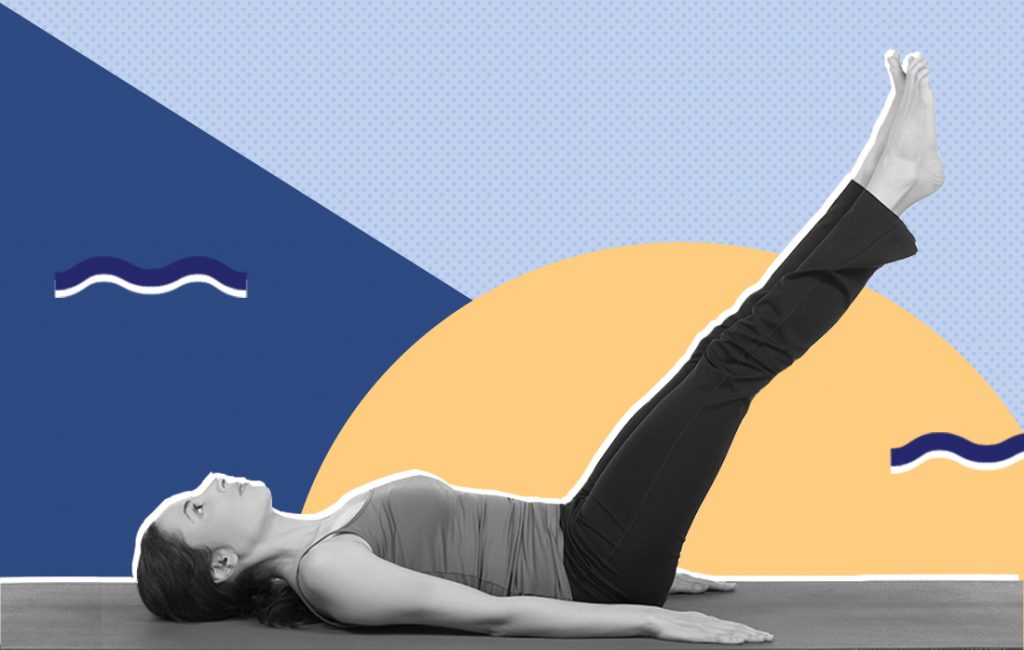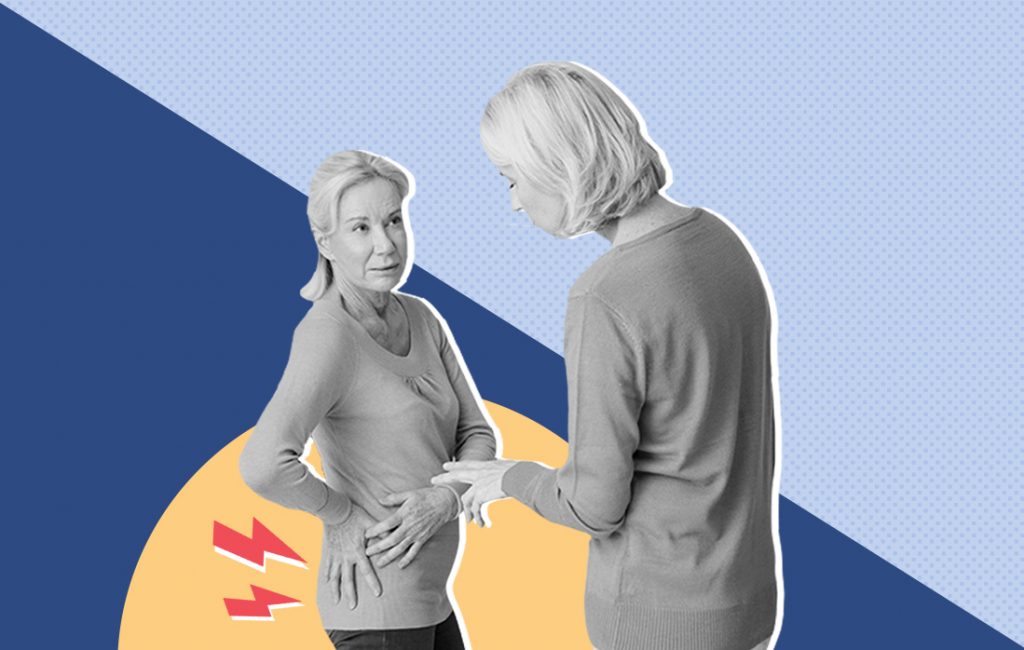A Guide to Better Sleep With Hip Pain
- by Paul Watson
- Updated: May 12, 2022
Table of Contents
Sleeping with hip pain can be difficult and troublesome. If you or your loved one suffers from hip pain, you are likely aware of how it can disrupt your sleep. In this article, we will discuss some of the causes of hip pain and how hip pain contributes to disturbed sleep. We will also hear from medical experts about ways to sleep better with hip pain.
Note: The content on Sleepopolis is meant to be informative in nature, but it shouldn’t take the place of medical advice and supervision from your healthcare provider. If you feel you may be suffering from any sleep disorder or medical condition, please see a trained medical professional.
Hip Pain and Sleep
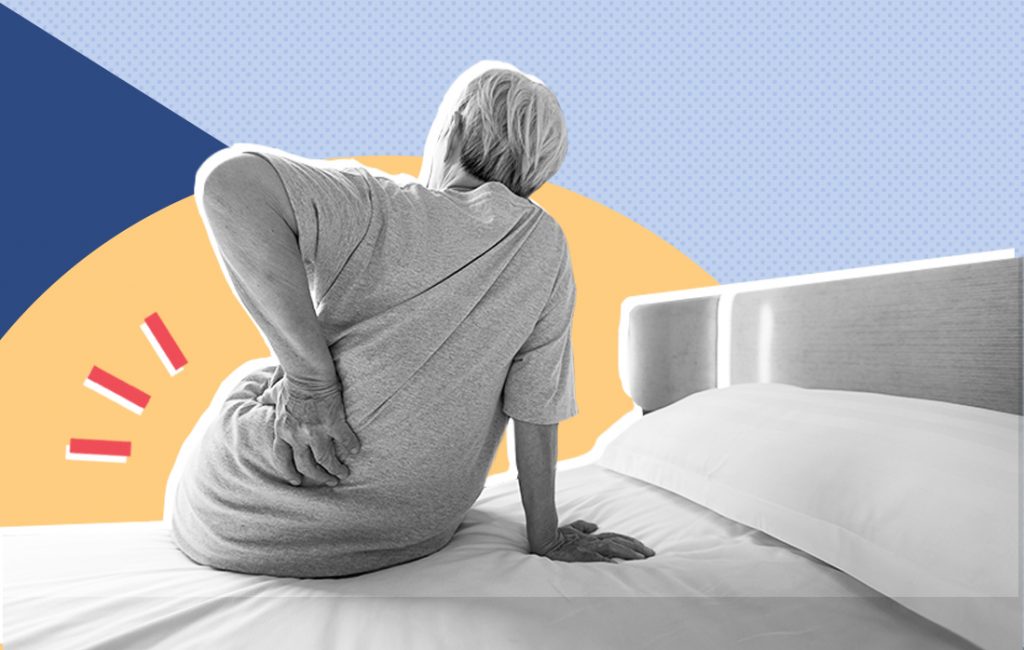
According to a 2012 study in the Brazilian Journal of Medical and Biological Research, hip pain can impair sleep. In addition, less than six hours of sleep can make the pain worse, since the restorative benefits of sleep are necessary to help ease hip pain. (1) All the more reason to learn some ways to improve sleep even in the presence of hip pain.
Dr. Jason Loth of Spine Align says hip pain can inhibit your quality of sleep. He says that hip pain may cause some folks to be unable to sleep in their preferred position, such as the side. For side sleepers with hip pain, Dr. Loth encourages them to consider switching to their back to prevent pressure on the hip. However, Dr. Keith Poorbaugh, owner of Northern Edge Physical Therapy, cautions that “most people suffering from hip pain are middle-aged adults (35-55). This is the same age group suffering from sleep apnea (OSA) which is aggravated with sleeping on the back.”
Dr. Poorbaugh notes that you should be able to find a comfortable position to sleep in, no matter what underlying condition is causing your pain. He says your goal should be to find a position in which your hips are centered and relaxed. Sleep aids may help with this, but he emphasizes the importance of finding the right mattress to suit your chosen position, which we’ll cover ahead. The US Department of Veteran Affairs says that the position you choose should align your hips with your shoulders and ears. (2)
Waking up in the night is a common complaint with folks suffering from hip pain. For instance, a study in the British Journal of Sports Medicine found that hip pain caused participants to awake at night, resulting in a diminished quality of sleep. (3) If your sleep is disturbed by hip pain, Dr. Poorbaugh suggests simple exercises to get the hips moving can improve blood flow and reduce joint irritability. He suggests movements like hip wiggles and squeezes which can be done on the side or lying on your back.
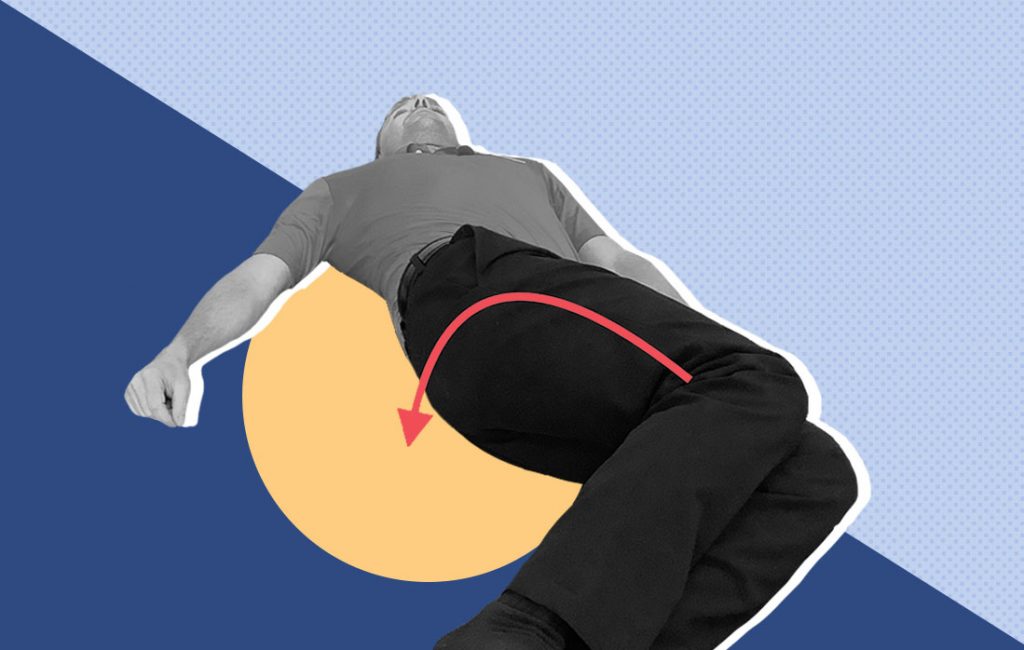
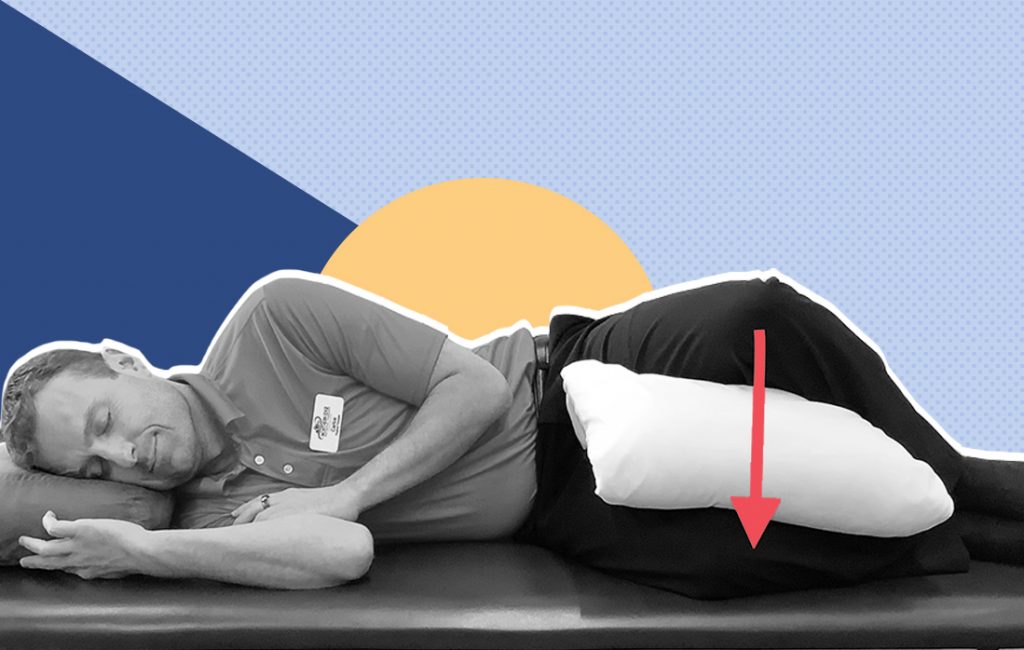
Hip pain can make falling and staying asleep difficult. A 2012 study in Arthritis Care and Research found that women with hip pain were most likely to experience fragmented sleep after the first two hours of sleep in the night. (4) One reason hip pain may worsen is a lack of distraction. In a 2010 Arthritis Care & Research study, researchers found that patients with hip pain were more aware of discomfort and pain throughout the night. The lack of distraction from daytime activities caused them to focus more on the pain. (5)
According to Ben Tanner, physician assistant and founder of FastingWell, while there are multiple causes for hip pain, the two most common are due to osteoarthritis (OA) and bursitis, specifically hip bursitis (also known as trochanteric bursitis).
How to Sleep Better With Hip Pain
Now let’s look at a few tips from medical experts on how to sleep better with hip pain. Not all of these may apply to you, but we hope you’ll find a tip that works for you.
Stretch and Strengthen Your Muscles
Dr. Mikulsky recommends stretching your thigh and hip flexor muscles to reduce stress on the hip joints. She says: “Maintaining proper core and hip strength can reduce undue pressure on soft tissue structures.” Dr. Loth agrees, saying that some ways you can stretch and strengthen your muscles is through yoga and Pilates. If group exercise is not an option, Dr. Poorbaugh suggests exercises to strengthen the primary supporting muscles for the hip, gluteal muscles. The gluteal muscles are the rotator cuff of the hip so exercises must involve lateral (sideways) and rotation so consider lateral shuffle or side lunges.
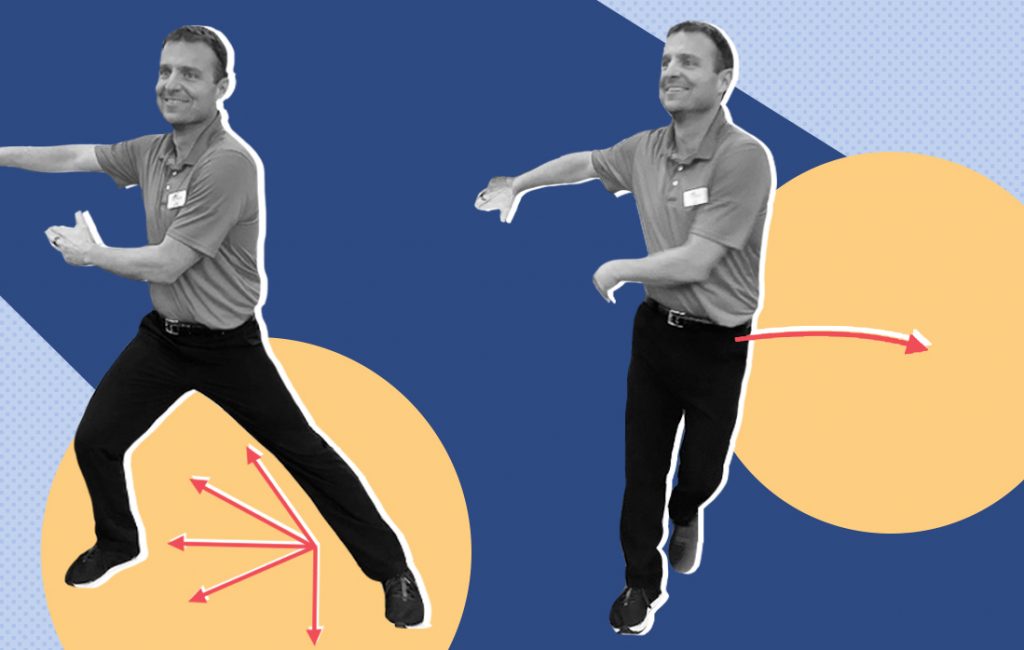
Use an Ice or Heat Pack
Dr. Mikulsky also recommends using an ice pack on the painful area for 10 minutes before bedtime to help reduce inflammation. Dr. Loth notes that you should never use an ice pack more than 20 minutes at a time, as it could damage your nerves.
If your hip pain is not inflamed, Dr. Loth suggests using a heat pack on the painful area. It can increase blood flow, which loosens your muscles and joints. If you do not have a heat pack, he says a hot shower or jacuzzi will also provide the same effect.
Sleep with an Extra Pillow
Ben Tanner says side sleepers may want to consider putting a pillow between their knees, as he says this could help keep your hips aligned and reduce strain on their hip joint. If you’re lying on your back, Dr. Mikulsky says you should place a pillow behind your knees to reduce tension on your lower back and hip muscles. Sleep expert Dr. Pietro Luca Ratti of WhatAsleep agrees, saying that placing a pillow behind your lower back and around your hips can help relieve pressure.
Choose the Best Mattress for You
Dr. Loth says that it is essential to have a high quality, supportive mattress. He says that sleeping on a worn out mattress will cause the mattress to sag. If this happens, your hips will not be supported properly, and your pain could worsen. When choosing the best mattress for hip pain, Ben Tanner says to consider a mattress with extra padding, especially if you sleep on your side. He says side-sleepers will want something softer since their hips may be digging into the mattress.
Exercise
According to the Harvard Medical School, exercise is one of the best ways to mitigate hip pain. They recommend creating a 30 minute routine in which you perform one or more of the following exercises:
- Swimming
- Abdominal curls
- Leg lifts
- Crunches
- Lifting hand weights (6)
Talk with Your Doctor
You may want to speak with your doctor about treatment beyond pain management. A 2020 study in BMC Musculoskeletal Disorders found that a multidisciplinary treatment approach that reduces pain, improves mental health, and addresses emotional problems were shown to help patients suffering from sleep disturbances as a result of hip pain. (7) Dr. Ratti agrees, saying that speaking with your doctor may help you discover ways to sleep better in spite of your pain.
The CDC cautions you to discuss the risks and benefits of medications you might take to manage your hip pain at night. They recommend asking about non-opioid options. If you are planning to take opioids, they recommend having a conversation with your doctor to discuss preventing opioid addiction and overdose. (8)
Last Word From Sleepopolis
We hope you have learned more about the relationship between hip pain and sleep. Keep in mind that stretching muscles, using the right mattress, and sleeping with an extra pillow between your knees are all ways you can mitigate sleeplessness as a result of hip pain. Please remember that we are not medical experts, so be sure to speak with your healthcare provider if you have any medical questions.
References
- Roizenblatt, M et al. Pain-related diseases and sleep disorders. Brazilian Journal of Medical and Biological Research. Aug, 2012.
- “Back Safety: Sleeping Positions.” US Department of Veterans Affairs. https://www.veteranshealthlibrary.va.gov/142,82348_VA
- De Oliveira, B et al. ‘My hip is damaged’: a qualitative investigation of people seeking care for persistent hip pain. British Journal of Sports Medicine. Jan 24, 2020.
- Parimi, N et al. Hip Pain while using lower extremity joints is associated with sleep disturbances in elderly Caucasian women: the Study of Osteoporotic Fractures. Arthritis Care and Research. Jul 2012.
- Woolhead, G et al. Night pain in hip and knee osteoarthritis: A focus group study. Arthritis Care and Research. Jun 2010.
- “Exercising with knee or hip pain” Harvard Medical School. Feb 24, 2017. https://www.health.harvard.edu/pain/self-help-for-osteoarthritis-of-the-knee
- Reddy, N et al. Sleep quality and nocturnal pain in patients with femoroacetabular impingement and acetabular dysplasia. BMC Musculoskeletal Disorders. Feb 28, 2020.
- “Talk to Your Doctor About Managing Your Pain.” Centers for Disease Control and Prevention. https://www.cdc.gov/injury/features/manage-your-pain/
Subscribe Today!
Get the latest deals, discounts, reviews, and giveaways!

